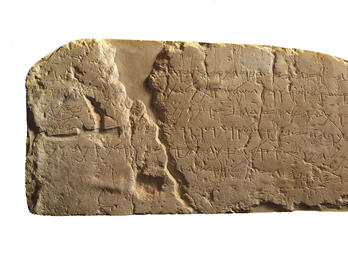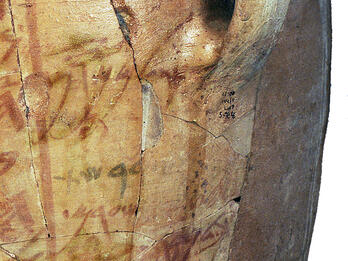The Tomb Inscription of the Royal Steward
ca. 700 CE
This is [the burial of Sheban]yahu, the steward of the palace. There is no silver or gold here, only his bones and the bones of his spouse. Cursed be the man who will open this.
This inscription was engraved over the entrance to an aboveground tomb in the cemetery in the village of Silwan, on the hill east of the City of David (see Tombs). It identifies the occupants of the tomb and pronounces a curse on anyone who would disturb the grave, in an attempt to discourage ancient grave robbers. The name of the principal occupant is damaged. It is generally presumed that he was Shebna, the steward in charge of the palace (Isaiah 22:15) who is addressed by Isaiah in Isaiah 22:16: “What have you here, and whom have you here, That you have hewn out a tomb for yourself here?—O you who have hewn your tomb on high; O you who have hollowed out for yourself an abode in the cliff!” This passage is the basis for the restoration of his name as Shebanyahu, the full form of the name Shebna.
Related Guide
Ancient Israelite Blessings and Curses
Blessings and curses were potent manifestations of the power of words.
Related Guide
Israelite Inscriptions from the Biblical Period
Even mundane inscriptions from the Hebrew Bible period offer valuable information about history, society, religion, economy, literacy, and much else.
You may also like
Fiscal Bulla from Jerusalem
Yehud Seal Impressions

The Siloam Inscription
The Gezer Tablet
A Prayer (?) from Kuntillet Ajrud



